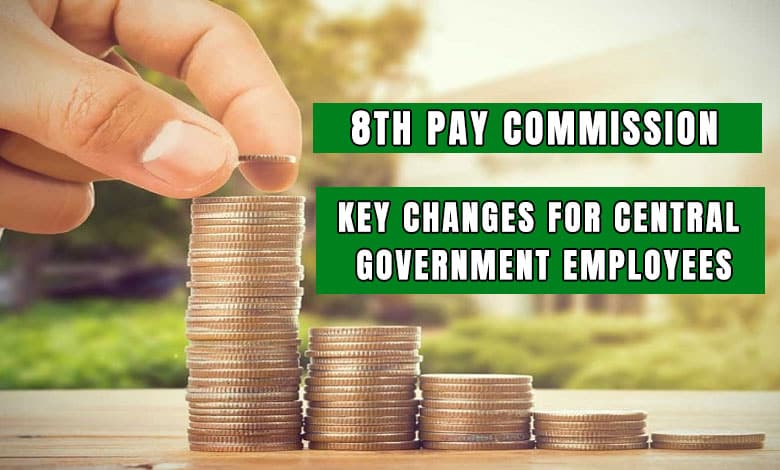8th Pay Commission: Key Changes Coming for Central Govt Employees in 2026 – What to Expect
The eagerly awaited 8th Pay Commission, which is expected to bring major changes to the salary and pension structure of central government employees, is set to be announced in the coming months.

The eagerly awaited 8th Pay Commission, which is expected to bring major changes to the salary and pension structure of central government employees, is set to be announced in the coming months. Over 1 crore central government employees and pensioners are closely following developments, as the commission’s recommendations are expected to come into effect in January 2026, potentially ushering in significant financial benefits.
Table of Contents
While the government has not officially confirmed the formation of the 8th Pay Commission, there is growing speculation that an announcement will be made during the Union Budget. If approved, the proposed changes could result in considerable salary hikes, revised pensions, and welfare measures aimed at improving the financial well-being of government staff and retirees.
Proposed Salary Hike Based on 2.86 Fitment Factor
One of the key highlights of the upcoming 8th Pay Commission is the recommendation for a substantial salary increase. Reports suggest that the National Council of the Joint Consultative Machinery (NC-JCM) has proposed a new fitment factor of 2.86, which would be used to calculate revised salaries and pensions for employees. If adopted, this factor would increase salaries by a multiplier of 2.86 times.
For context, under the 7th Pay Commission, the fitment factor was set at 2.57, which increased the minimum salary from Rs 7,000 to Rs 18,000. With the new fitment factor of 2.86, the minimum basic salary could potentially rise to Rs 51,480 from the current Rs 18,000, resulting in a significant pay hike for employees.
Impact on Pensioners
The proposed salary hike would also have a direct impact on pensioners. At present, the minimum pension for retired employees is Rs 9,000, calculated with the 7th Pay Commission’s fitment factor of 2.57. However, with the new proposed fitment factor, the minimum pension could increase to Rs 25,740, offering much-needed relief to retirees.
Also Read: Dubai Cafe’s Rs 1 Lakh ‘Gold Karak’ Tea Goes Viral: Watch the Luxurious Tea Experience
Revised Dearness Allowance (DA) and Perks
In addition to salary and pension changes, the 8th Pay Commission is expected to revise the Dearness Allowance (DA) and other perks to align with the updated basic salary. DA, which is crucial in compensating for inflation, is typically reviewed twice a year. The proposed revisions are expected to provide further financial relief to employees, ensuring that their compensation keeps pace with rising costs of living.
Unified Pension Scheme to Be Introduced
Another significant reform that could impact government employees is the introduction of the Unified Pension Scheme (UPS), set to be implemented on April 1, 2025. Under this new scheme, pensions will be calculated based on the employee’s salary during the 12 months prior to retirement, enhancing the retirement benefits for government employees.
Awaiting Official Announcement
As the anticipation builds, central government employees and pensioners are hopeful that the government will address their demands in the upcoming Union Budget. The changes recommended by the 8th Pay Commission, if approved, could significantly improve the financial security and quality of life for both current employees and retirees.
While the official announcement is still pending, these proposed changes have already generated optimism among the workforces. If the 8th Pay Commission is implemented as expected, it could mark a major step in ensuring the welfare of central government employees in the coming years.
